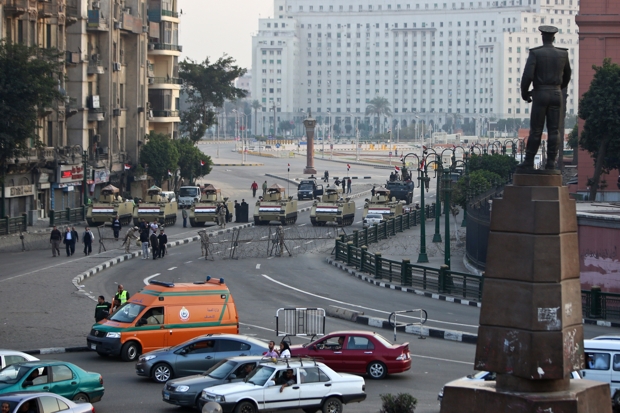Cairo’s Tahrir Square is turfed and tarmacked. Traffic police bustle about, watched at a distance by the soldiers in their tanks. There are few signs that this used to be more than just an intersection.
But four years ago this week, it was at the heart of a revolution. After 18 days of mass protests, Egypt’s longtime dictator Hosni Mubarak resigned and the square exploded.
The uprising was meant to signal a new era of freedoms and dignity for the country’s 90-million strong population. But instead, the revolution has soured. Egypt’s first democratically elected president, Mohamed Morsi, managed only one divisive year in office before being overthrown by another strongman, Abdel Fattah al Sisi in July 2013.
Now president, Sisi has presided over a searing crackdown against Morsi’s Muslim Brotherhood, as well as the revolutionary activists who led the uprising in the first place.
With hundreds dead and thousands in prison, Egypt’s government is now trying to keep a lid on dissent and lure back international investors in the process. Even Tahrir Square has morphed into a symbol of the new Egypt. On its western flank, builders are putting the finishing touches to a grand new hotel, ready for a slow trickle of tourists.
Last month, Britain brought its biggest trade delegation to Egypt for a generation, a sign that investor confidence is growing. At their evening drinks reception, delegates echoed the phrase on posters throughout the room: ‘Business is GREAT.’
But Egypt’s promised economic recovery – deeply necessary in a country with high poverty and unemployment rates – has a darker side, underpinned as it is by a new legal architecture built to extinguish dreams of another revolution.
Authoritarian laws are being introduced at a rate unmatched by any regime here for 60 years – unofficial protests are now banned, the jurisdiction of military courts has expanded, and several limits on pre-trial detention have been removed. Inside police stations, torture and abuse is rife and last year, scores of people died inside the country’s dirty jails last year.
While police brutality was a catalyst for the 2011 revolution, popular anger is muted this time around. Many here have swung behind the repressive security state as a bulwark against the political turmoil that came in Mubarak’s wake.
After Morsi, the threat grew bigger, and Islamist militants flourished in Egypt’s eastern peninsula. Last Thursday, Islamic State loyalists mounted one of the deadliest attacks on Egypt’s army in decades – up to forty people were killed, and over 100 injured.
‘There is a time and place for human rights, but this is not it,’ says Khaled Abdelhamid, a kiosk owner in downtown Cairo. ‘How can we fight this terror if we do not stand behind our president?’
It’s the sort of sentiment that the government now demands – those who voice dissent risk being added to the roster of over 40,000 people arrested since July 2013.
The crackdown has also been backed by an influential, often loyalist media – last year, the editors of Egypt’s 17 main newspapers pledged not to criticise the country’s key institutions.
But as the fourth anniversary of Egypt’s soured revolution flitted past last month, the cracks are starting to show. On Monday, Egypt’s flagship state newspaper Al-Ahram – often seen as a government mouthpiece – condemned the killing of a 31-year old leftist activist Shaimaa al-Sabbagh, gunned down in broad daylight as she carried flowers to Tahrir Square. Video evidence shows a uniformed police officer apparently directing a masked man to shoot toward Sabbagh and other activists.
In a frontage editorial, Al-Ahram blamed the police for her murder and called Sisi to action, a rare show of defiance and one that seemed to signal divisions within the regime over the use of force on the streets. But the window for accountability was quickly slammed shut when a key eyewitness was arrested on suspicion of murder instead.
At Sabbagh’s funeral, mourners said they did not expect justice. ‘It’s been four years and thousands killed, but they’ve only jailed two policemen,’ said activist Ahmed Atef. ‘This was a revolution that fooled us to hope – we know better now.’






Comments